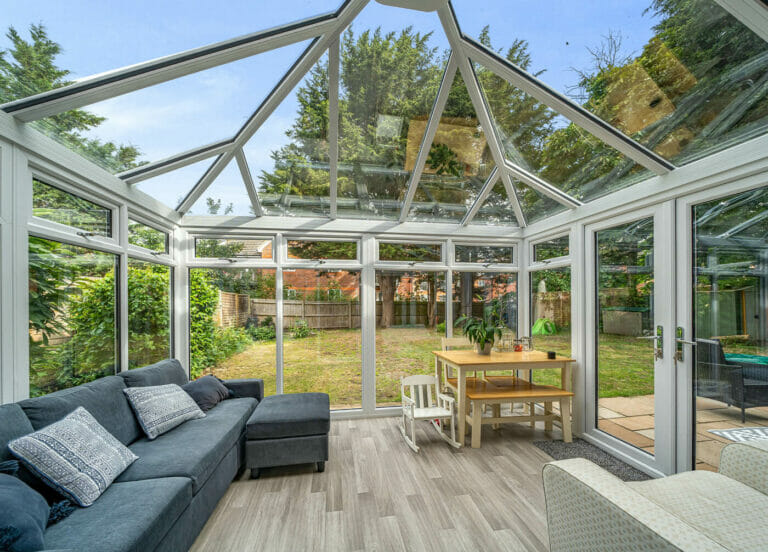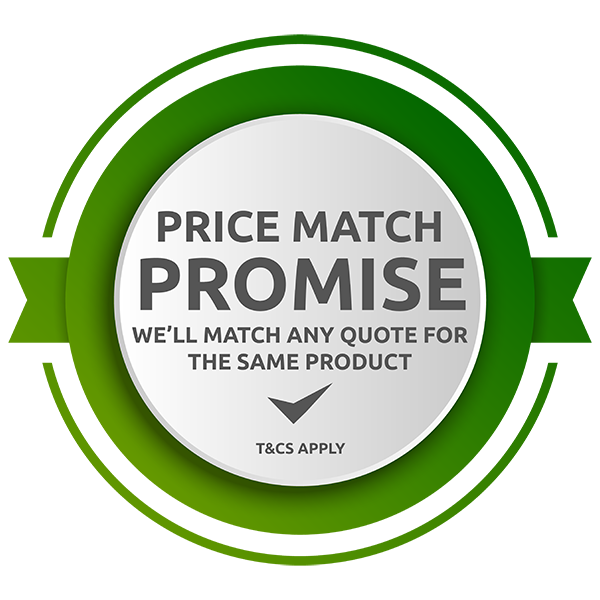Quick FAQs
[rank_math_rich_snippet id=”s-8ffaddf0-ad72-49f6-85f9-660458613018″]
When it comes to building or renovating a conservatory, one of the most crucial decisions you’ll face is choosing the type of roof. Each option comes with its own set of advantages and disadvantages,
and the choice depends on your specific needs, budget, and aesthetic preferences. In this article, we’ll explore the benefits and drawbacks of three popular conservatory roof materials: polycarbonate, warm roof, and glass.
Types of Conservatory Roofs
Modern conservatories have come a long way. There is now a great deal of choice when it comes to different conservatory designs, using a range of materials, to suit various properties and homeowners’ individual needs and preferences.
The fully-glazed conservatory with a glass roof is often what springs to mind but this is now one of many options available. Conservatory styles include Edwardian, Victorian, gable-end, lean-to, flat roof and letter-shaped (such as an ‘L’ or ‘T’).
Material options for conservatory roofs include glass, polycarbonate and warm roofs. There are also options for a solid roof, a hybrid solid and glass roof, and a tiled conservatory roof.
With so many styles and materials to choose from, it can feel a little overwhelming. But no matter what style or design you select, you can give some consideration to roof options according to the following criteria.
Considerations When Selecting Your Conservatory Roof Type and Material
When selecting the type of roof and material for a conservatory, homeowners are advised to first and foremost consider what the space will be used for, how often and by whom. You want the space to be fit for purpose. Once you know how the space will be used, you can think about other criteria:
- Your budget
- Which direction your conservatory faces
- How much light you want in the space
- The level of insulation you require
- How connected to the outdoors you want to feel
- The style of your property
Polycarbonate Conservatory Roofs
Polycarbonate is a lightweight, yet strong thermoplastic roof material. Polycarbonate roofing sheets are low cost, easy to install and developments in technology have led to varieties that offer better insulation. As well as conservatory roofs, polycarbonate is a popular choice for lean-to roofs, canopies and carports.
Benefits of polycarbonate conservatory roofs
- Affordability
Polycarbonate roofs are often the most budget-friendly option. They provide decent insulation without breaking the bank. - Diffused light
Polycarbonate sheets diffuse sunlight, reducing glare and creating a softer, more comfortable indoor environment. - Good UV protection
Polycarbonate typically has a UV-resistant coating, protecting your furniture and flooring from sun damage.
Disadvantages of polycarbonate conservatory roofs
- Limited insulation
Polycarbonate roofs have less insulation compared to other materials, making them less suitable for extreme temperatures. They may get too hot in summer and too cold in winter. - Less appealing aesthetics
Some homeowners find the appearance of polycarbonate less appealing compared to glass roofs. They also fare less well in harsh weather, becoming scratched. This can make them look weathered and old sooner than other conservatory roofing options. - Noisy
During heavy rain, the noise of raindrops hitting polycarbonate can be louder than other roofing options.
Warm Roof Conservatory Roofs
A warm roof – as the name suggests – is an insulated roof. They are solid and durable. Velux windows, skylights or downlights can be fitted so they can still make the most of natural light, providing a warm, bright and comfortable space.
Benefits of warm conservatory roofs
- Excellent insulation
Warm roofs provide superior thermal insulation, maintaining comfortable temperatures year-round. They are energy-efficient, helping to reduce heating and cooling costs. - Versatility
You can use warm roofs for various purposes, such as an extra living space, home office, or dining area, thanks to their thermal performance. - Reduced noise
Warm roofs are known for their soundproofing qualities, ensuring a quiet and peaceful environment inside.
Disadvantages of warm roof conservatory roofs
- High cost
Warm roofs are usually more expensive to install initially due to the higher-quality insulation materials. - Heavier load
The added weight of a warm roof may require additional structural support in some cases.
Glass Conservatory Roofs
Depending on the type of glazing you choose, glass conservatory roofs can provide beautiful aesthetics, efficient efficiency and maximum light levels. Glazing options include:
- standard toughened safety glass
- double-glazing – with enhanced heat insulation and soundproofing
- eco-friendly, energy-efficiency glass
- blue self-cleaning, solar control glass
Benefits of glass conservatory roofs
- Natural light
Glass roofs flood your conservatory with natural light, creating a bright and inviting space. - Pleasing aesthetics
They provide a modern and stylish look, often becoming a focal point of your home. - Good thermal performance
Modern glass roofs come with advanced glazing options that offer good insulation and UV protection. - Durability
With good maintenance, a glass conservatory roof will last around 10 – 15 years – longer than a polycarbonate roof.
Disadvantages of glass conservatory roofs
- Heat management
Glass roofs can become very hot in summer, requiring blinds or shading solutions to control temperature. - Reduced privacy
Depending on your location and surroundings, a glass roof may compromise your privacy. - Higher maintenance
Glass roofs require regular cleaning to maintain their clarity and appearance. Self-cleaning glazing is an option worth considering.
Which Type of Conservatory Roof Is Right for My Property?
In conclusion, the choice of conservatory roof material depends on your specific needs and priorities. If cost is a concern, polycarbonate may be the way to go. For superior insulation and versatility, warm roofs are an excellent choice. Glass roofs provide a bright, modern aesthetic but may require additional measures for heat control. Consider your specific needs, budget, and the climate in your area when making your decision, and consult with a professional for personalised advice.
Want to discuss the best type of conservatory roof for your home?
We know that choosing the right roof for you convservatory is a big decision, so please get in touch if you need more help. We’ve got years of experience installing a range of conservatory roofs and a member of our team will happily discuss your needs and help you find the best fit.
- Don’t Replace Yet! When and How to Repair Windows and Doors - April 24, 2024
- Three Counties Now Offers Kubu Smart Home Security Sensors! - March 26, 2024
- Time for a New Front Door? Here’s How to Tell - February 19, 2024

